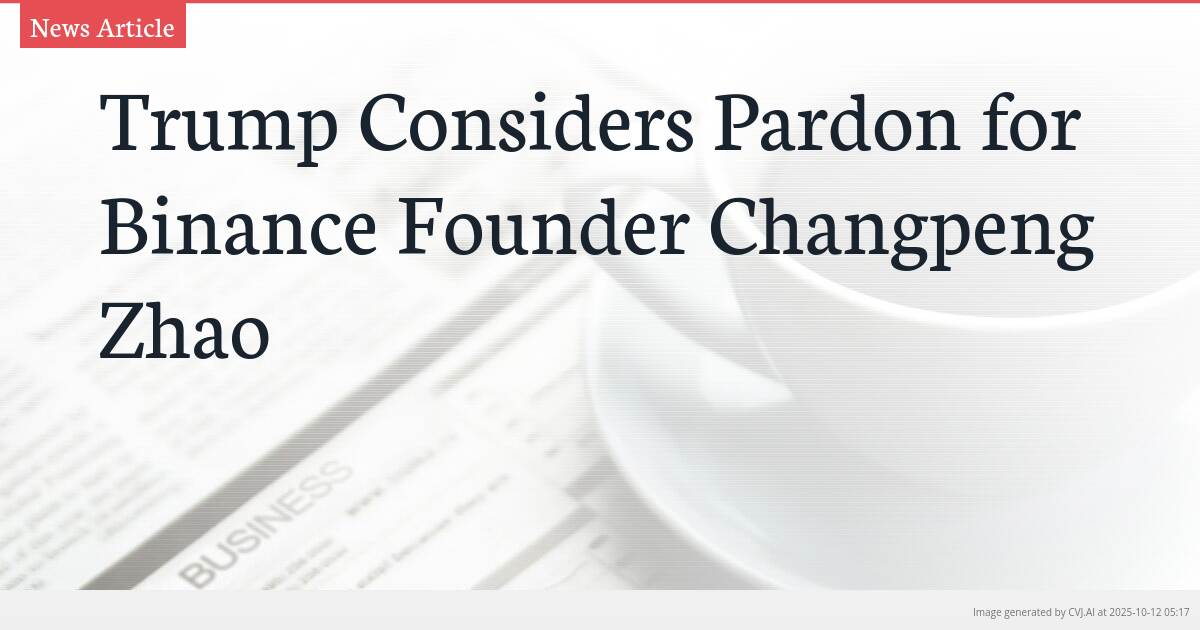This summary text is fully AI-generated and may therefore contain errors or be incomplete.
Introduction
Former President Donald Trump is reportedly considering a presidential pardon for Binance founder Changpeng Zhao, a move that could reshape the cryptocurrency landscape by potentially restoring one of the industry’s most influential figures. According to sources close to the White House, discussions between Zhao’s representatives and Trump administration officials have intensified in recent weeks, with many Trump insiders believing the money laundering case against the former Binance CEO was weak and didn’t merit felony conviction.
Key Points
- Zhao pleaded guilty to money laundering charges, served 4 months in prison, and paid $4.3 billion in fines as part of a 2023 settlement with the DOJ
- Trump administration officials view Zhao's case as an opportunity to demonstrate a new era of cryptocurrency policy different from Biden's crackdown
- Zhao remains Binance's largest individual shareholder and a pardon could potentially allow his formal return to the exchange he founded in 2017
White House Discussions Intensify
According to Charles Gasparino, senior business correspondent at FOX Business, discussions inside the White House regarding a potential pardon for Changpeng Zhao have been heating up in recent weeks. People close to Zhao, commonly known as CZ in cryptocurrency circles, indicate that Trump administration officials are seriously considering clemency for the former Binance chief. Gasparino stated on social media platform X that “Many Trump insiders believe the fraud case against [CZ] was pretty weak, and certainly not something that merited a felony conviction and jail time.”
The timing of these discussions comes as Zhao had previously applied for a pardon from President Trump following his release from prison in May, though reports indicate he was denied at that time. The renewed consideration suggests a shift in the administration’s position, potentially reflecting evolving attitudes toward cryptocurrency regulation and enforcement. The discussions represent a significant development in the ongoing relationship between the United States government and the digital asset industry.
The Case and Consequences
Changpeng Zhao’s conviction in 2023 marked one of the most high-profile cases during what many in the cryptocurrency industry characterized as the Biden administration’s war on crypto. Prosecutors alleged that Binance, under Zhao’s leadership, allowed illicit transactions with sanctioned entities and failed to implement adequate anti-money laundering controls. The case resulted in Zhao pleading guilty to the charges and stepping down as CEO of the exchange he founded in 2017.
The financial penalties were staggering: Zhao personally paid $50 million in fines, while Binance paid $4.3 billion to settle the case with the US Department of Justice. Zhao served a four-month prison sentence in a low-security federal prison in California, followed by time in a halfway house. Despite his conviction and temporary removal from leadership, Zhao remains the largest individual shareholder at Binance, maintaining significant influence over the world’s largest cryptocurrency exchange.
Political Implications and Industry Impact
The potential pardon carries significant political implications, with Trump’s team reportedly viewing Zhao’s situation as an opportunity to demonstrate a new era of cryptocurrency policy distinct from the previous administration’s approach. However, the administration is simultaneously concerned about the optics of pardoning Zhao, particularly given President Trump’s own involvement in the digital asset space through his family’s company, World Liberty Financial.
A presidential pardon for Zhao could have far-reaching consequences for the cryptocurrency industry, potentially clearing the way for his formal return to Binance and restoring his standing within the ecosystem. The move would signal a dramatic shift in the United States’ approach to cryptocurrency regulation and enforcement, potentially encouraging greater innovation and investment in digital assets like BTC and ETH. For an industry that has operated under regulatory uncertainty, a pardon for one of its most prominent figures would represent a significant validation.
The decision ultimately rests with President Trump, who must weigh the potential benefits of demonstrating a more crypto-friendly administration against the political risks of pardoning a figure convicted of money laundering charges. The outcome will likely shape the relationship between the United States government and the cryptocurrency industry for years to come, potentially influencing everything from regulatory frameworks to institutional adoption of digital assets.
📎 Read the original article on co.uk

